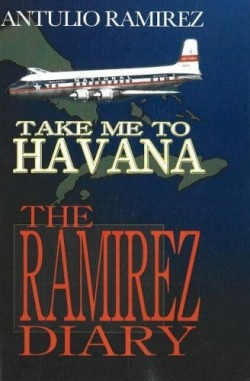
Take Me to Havana
The Ramirez Diary
…when I decided to carry out a task, I did it. Once I had decided on a course I would follow it to the brink of the precipice.
If anyone is in a position to compare Cuban prisons and secret police (both Batistiano and Fidelista) to American counterparts, it’s Antulio Ramirez. Locked up by three rival governments, a rarefied bad luck and casually chosen screw-ups have had their way with most of his adulthood. His fifteen minutes of fame occurred in 1961, when the author pioneered a disruptive fad by hijacking an airliner and demanding delivery to Castro’s capitol city.
Some agencies accused Ramirez of being a CIA or FBI plant, but the self-portrait is that of an “emotional adventurer”—the same descriptor associated with Lee Harvey Oswald in a classified G-2/KGB file Ramirez claims he saw, pre-assassination. A warning to the U.S. State Department, sent through the Swiss embassy in Havana, was rerouted to Castro’s officials. The author holds the Swiss responsible for Kennedy’s death.
At first, Ramirez bunked at secret police headquarters, met with Castro and wandered about freely. Disappointment with Castro’s commitment to Soviet Communism and individual tyranny led to frustrated efforts to leave, and more prison time. “I suddenly realized that I was on the wrong side of the fence. By stealing that plane I had assumed a ridiculous role.”
Antulio Ramirez was born an American citizen in Puerto Rico. A Korean War veteran and electrician by trade; the Granddaddy of Skyjackers is paradoxically proud and ashamed. He hasn’t seen his children since leaving California for Cuba in 1961. Why did he go, and why skyjack to get there? The motive is weakly explained. Either in unfocused ideological support of revolution or as a result of a backfired short-con attempt on (alleged) diplomats of the Dominican Republic.
The book has flaws. Small-point copy crowds the margins—roughly 175,000 words worth of squinting. Organization isn’t optimal; irrelevancies in places receive a similar emphasis as tremendously important events; the narrative style isn’t far from stream of consciousness. The sheer repetition of Ramirez’s fruitless challenges of fate, the hassling officials of Havana’s Swiss Embassy, defies the guidelines of Skinner’s behaviorism.
Is this the account of an agent provocateur, a duped troublemaker or relatively innocent Cold War casualty? Actual names are named, explosive conversations are reconstructed; times and addresses are exact. Coveted film negatives of Mig fighter-planes assigned to attack U.S. cities are a huge albatross and an insurance policy as well. One suspects considerable improvisation, but Ramirez’s claims at least partially check out with the House Subcommittee on Assassinations. None have been clearly disproven to date, though there is doubt that he had access to G-2 files. The indictment of Fidel Castro in the death of Kennedy, though not new, is serious business. Antulio Ramirez penned this remarkable diary while incarcerated in Leavenworth.
Disclosure: This article is not an endorsement, but a review. The publisher of this book provided free copies of the book and paid a small fee to have their book reviewed by a professional reviewer. Foreword Reviews and Clarion Reviews make no guarantee that the publisher will receive a positive review. Foreword Magazine, Inc. is disclosing this in accordance with the Federal Trade Commission’s 16 CFR, Part 255.
